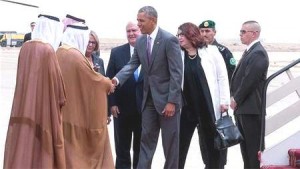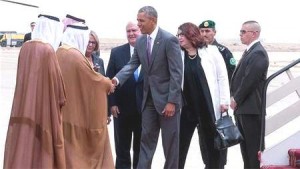Al Jazeera
Khaled M Batarfi
 Once again, the United States feels the urge to reassure members of the Gulf Cooperation Council that it is still their best friend and ally. Since its two-year secret negotiations with Iran that started in 2011 came to light in 2013, Arab trust in the US has been at its lowest level. It hasn’t been so low since Saudi King Faisal bin Abdulaziz led the Arab oil embargo against the US and other Israel supporters, in 1973.
Once again, the United States feels the urge to reassure members of the Gulf Cooperation Council that it is still their best friend and ally. Since its two-year secret negotiations with Iran that started in 2011 came to light in 2013, Arab trust in the US has been at its lowest level. It hasn’t been so low since Saudi King Faisal bin Abdulaziz led the Arab oil embargo against the US and other Israel supporters, in 1973.
It looks like President Barack Obama and his envoys’ multiple trips to Gulf nations, myriad meetings with Gulf leaders, and many statements, were nothing more than a “mission impossible” to explain the unexplainable.
Saudi King Abdullah’s meeting with the US president in March 2014 was “frank”, according to a US delegate. According to Prince Turki al-Faisal, a former Saudi ambassador to the US, it was beyond frank. In diplomacy terms, this translates to “confrontation”.
The king was frustrated with the US betrayal of their Arab allies, in favour of Iran. According to Faisal, he banged on the table, telling Obama: “No more red lines, Mr President.” This means Saudi Arabia would no longer listen attentively to US “advice”. If it did, Bahrain would have been an Iranian province years ago.
US reservations
Again and again, Saudi Arabia decided to ignore US reservations and positions in Syria, Egypt, Iraq and Yemen. It stood firmly against US policies that would have brought more firestorms to a volatile region already on the verge of an explosion.
Under the US watch, Iraq is close to becoming a failed nation. US-backed leaders handed the country to Iran, which has lots of interests to gain and accounts to settle there, and has used and abused religion to divide and rule.
Iranian policies created a friendly environment for extremists on all sides. Islamic State of Iraq and the Levant group (ISIL, also known as ISIS) is an offshoot of al-Qaeda, and both are sponsored by Iran. In the other camp, Hezbollah is leading the Shia extremists in the region.
In Syria, the US has just let it happen. Iran wouldn’t dare to get so close to Israel’s borders without a green light from Uncle Sam.
In Yemen, the US supported Ali Abdullah Saleh’s government and his Houthi enemies at once. After the adversaries became allies, the US cooperated with both in a desperate bid to defeat al-Qaeda. It turned a blind eye to Iran’s heavy political, financial and military support of the new Yemeni alliance regardless of the danger they pose to its Gulf partners.
Made-in-the-USA “creative chaos” is the brainchild of the neoconservatives led by George W Bush’s vice president Dick Cheney, Defense Secretary Donald Rumsfeld and National Security Adviser and later Secretary of State Condoleezza Rice. Since Iran is the manager of this mess, one might wonder how much of a collaboration the US has had with Iran?
The US seems to be looking for a new sheriff in the region who won’t mind a partnership with Israel. Once found, it could then divert its attention to more interesting, peaceful and accommodating parts of the world, such as South Asia and South America, while resting assured that the region, US interests and Israel’s security are well taken care of.
Sheriff Iran
This scenario looks attractive for naive academics who don’t realise that “Sheriff Iran” is not ruled by a pragmatic, logical leadership, but by ultra-fundamentalists obsessed with historical ambitions of a grand Persian empire. They would turn against the US at any moment when their interests diverge. They did it before, and will do it again. By then, traditional US allies would be gone.
The GCC meeting with Obama in Riyadh, the third of its kind in less than a year, is expected to raise serious questions about US intentions and hidden agendas. More important is what is next. Are these policies institutional, or just the doctrine of a loner?
Would these positions change with a new president come elections in November, or are they representative of new US trends? The answers depend to a great extent on who is behind the change of heart and attitude.
Principles and long-term strategies cannot be revised so fast and easily by one man alone – even a president.
Therefore, what comes next for GCC countries and the Middle East should be read not only from the eyes and lips of the visiting US delegation, but also in the corridors of power, back in Washington.



